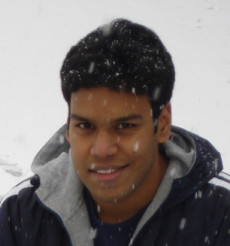Kamesh Madduri Is Named 2008 Alvarez Fellow
August 8, 2008
Kamesh Madduri’s interest in computers ignited at age 10, when the first wave of PCs arrived in India and gave him a new medium to play games on. Eventually this fascination grew to include programming, computer science, and finally supercomputers.
Now, Madduri’s lifelong hobby has brought him to the Berkeley Lab in California, as a prestigious Luis W. Alvarez Fellow in Computing Sciences. He will spend the next few years working with Arie Shoshani and the Scientific Data Management group, developing algorithms that will allow researchers to efficiently sift thought large datasets for the bits of information that they are relevant to their work.
“Great technological advances allow scientists to do a lot more, which means that the amount of scientific data that needs to be managed is constantly growing,” says Madduri. “It is really exciting to be working on large-scale applications, and solving cutting-edge problems that affect the larger science community.”
Madduri’s work will allow researchers to quickly search for relevant information when data is presented in a graph-like structure. Similar to the way social networks represent “friends,” this graph-like perspective shows how individual elements are connected in complex ways.
“On social networking sites like Facebook, you are connected to all sorts of people in different ways — you are connected to ‘friend B’ because you were former schoolmates, connected to ‘friend C’ through mutual friends, and met ‘friend D’ at a nightclub. A graph data structure allows you to see all of those different and complex connections,” says Madduri. “If scientists are able to study or analyze their data in a similar fashion, with a systems perspective, they may find unexpected connections, and that is very interesting.”
This past August, Madduri received a Ph.D. specializing in computational science and engineering from the Georgia Institute of Technology in Atlanta, Ga. Prior to that, he completed a bachelor’s degree in electrical engineering at the Indian Institute of Technology Madras, in Chennai, India.
He currently lives in South Berkeley. Outside of work, Madduri enjoys reading, sipping coffee in cafes around downtown Berkeley, and exploring San Francisco.
The Alvarez fellowship, named for Dr. Luis W. Alvarez, the Nobel Laureate and physicist who worked at Berkeley Lab, was established to encourage the development and application of tools to advance scientific research.
About Computing Sciences at Berkeley Lab
High performance computing plays a critical role in scientific discovery. Researchers increasingly rely on advances in computer science, mathematics, computational science, data science, and large-scale computing and networking to increase our understanding of ourselves, our planet, and our universe. Berkeley Lab’s Computing Sciences Area researches, develops, and deploys new foundations, tools, and technologies to meet these needs and to advance research across a broad range of scientific disciplines.







 Instagram
Instagram YouTube
YouTube